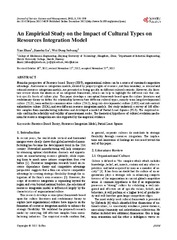An Empirical Study on the Impact of Cultural Types on Resources Integration Model
Permanent lenke
http://www.nb.no/idtjeneste/URN:NBN:no-bibsys_brage_38930https://hdl.handle.net/11250/145285
https://hdl.handle.net/10037/8385
Dato
2012Type
Journal articleTidsskriftartikkel
Peer reviewed
Sammendrag
From the perspective of Resource-based Theory (RBT), organizational culture can be a source of sustained competitive advantage. And resources integration models, divided by property rights of resource, not firm boundary, as internal and external resources integration models, are presented as being specific in different cultural contexts. However, the litera- ture review shows the absences of an integrated framework, which can help to highlight the different role that con- text-specific facets of culture play. This paper develops a conceptual framework based upon the culture literatures and evolutionary theory to define the relationship between four different cultural types, namely team-long-developmental culture (TLD), team-authority-communicative culture (TAC), long-risk-developmental culture (LRD) and risk-control- authoritative culture (RCA), and two different resource integration models. Our study undertook a survey of 168 effec-tive samples from manufacturing industries and developed a model of Partial Least Squares (PLS). The empirical re- sults confirm the reliability and validity of measurement scales. The theoretical hypotheses of cultural evolution mecha- nism for resource integration are also supported by the empirical evidence.
Metadata
Vis full innførselSamlinger
Følgende lisensfil er knyttet til denne innførselen:


 English
English norsk
norsk